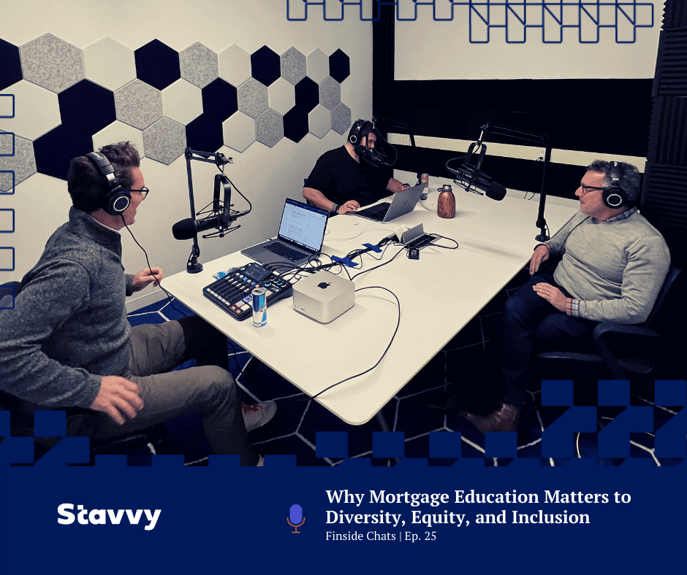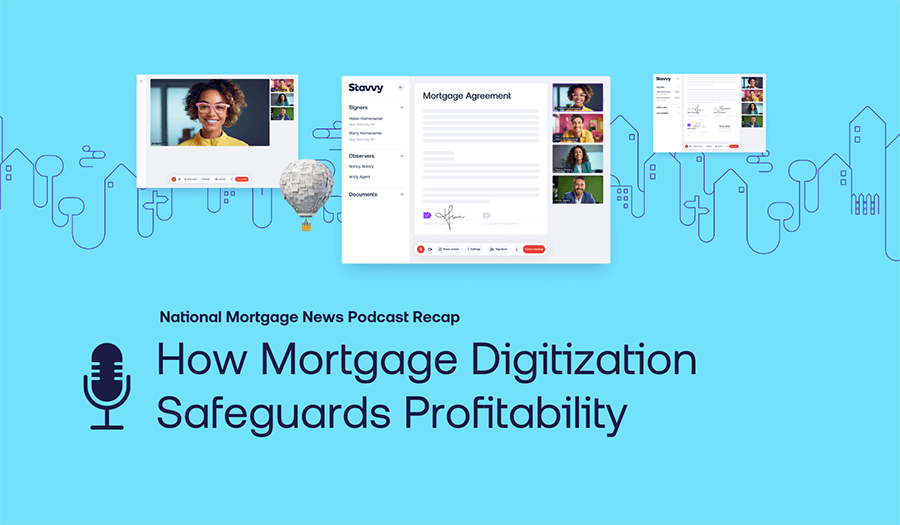Lack of mortgage education is intimidating for up-and-coming talent wanting to start a career in the industry. But what if there was a mortgage training program that recruited and trained participants from varied backgrounds? What would that mean for diversity, equity, and inclusion in the mortgage industry - and beyond?
Paul Gigliotti of the nonprofit Axis Lending Academy sees this mortgage education gap as an opportunity to do better as an industry, starting with entry-level positions.
“As a leader in the mortgage lending industry, I saw daily the bottleneck created in the mortgage lending manufacturing process due to a lack of fresh talent. So I started thinking about why it is so hard for fresh talent to enter the industry, and I kept returning to lack of education.”
– Paul Gigliotti, Axis Lending Academy
Paul joined Stavvy’s Finside Chats® podcast for its Season 2 premiere to discuss what inspired him to co-found his company and how he envisions mortgage education moving forward.
On this episode of Finside Chats®, you'll learn more about:
- How the lack of mortgage education hurts progress and diversity in the industry
- The ways education and continued education in the mortgage industry can boost diversity, equity, and inclusion
- Why an educational component to the mortgage industry is vital to providing more perspective and insight
Listen now: Why Mortgage Education Matters to Diversity, Equity, and Inclusion
Mortgage training programs versus mortgage education
The mortgage industry is known for its extensive mortgage training programs but lacks a formal education path, leading to inequity and a shortage of diversity in the industry.
Perhaps more than any other industry, people who work in the mortgage space – from real estate agents to title agents to mortgage brokers – incorporate continuous professional development through conferences, classes, and industry events. This preference for mortgage training certainly boosts the expertise of the people already in the industry, but what is the career plan for a person just starting?
Paul says that the answer is complicated and severely fragmented.
“The mortgage lending industry is well known for training…but when you train individuals on a particular thing, you're placing their function almost into a silo, right?” Paul said. “Because you're not empowering them with the entire function, the whole manufacturing process of whatever the product may be – which, in our case, is a mortgage note.”

Paul would like the industry to take a more holistic approach to educating professionals, starting with recruiting and training entry-level workers. This is modeled in the education path at Axis Lending Academy, which includes foundational mortgage industry knowledge and a paid internship for a title company, all free to the learner.
Mortgage education to diversify the industry
Momentum for better representation within the mortgage industry is growing, but it requires a whole-industry push to see continued success.
At Axis, Paul and his team connect with people from diverse backgrounds on the ins and outs of the mortgage landscape, beginning with baseline education and building on that knowledge. Individuals can take advantage of the courses, but Paul says the most significant positive impact comes from established industry organizations investing the time and resources to educate new and existing workers – particularly workers from traditionally underrepresented backgrounds in the mortgage industry.
“I thought about when I'd walk into a boardroom and be the only gay male there, or I'd walk into, you know, a conference room and be the only gay male there, and it caused me to kind of hide in a corner almost,” Paul said of his inspiration to prioritize diversity, equity, and inclusion as part of the Axis mission. “You feel like you are the only one, so all eyes are on you.”
Changing the culture to achieve the needed balance of diversity in the mortgage industry will take entire companies committing to the same goal and putting action steps in place to complete it.
“It's really important to help individuals in our industry understand that their diversity is their superpower,” Paul said.
Taking action to improve mortgage education, industry-wide
Changing the face of mortgage industry professionals, and finding ways to onboard a wider group of people, starts with looking for gaps in delivering that education.
“We've started to pull out portions of our syllabus and offer them to organizations; wellness, blueprint programs to support creating lift within organizations, cultures, and environments,” Paul said. “We want to continue supporting technology companies and solution providers with banking and lending education so that they understand how their solution supports that larger manufacturing process.”
And the timing couldn’t be better to streamline education in the industry, with more mortgage professionals reacting to consumer demands for change by implementing remote online notarization and other digital closing and servicing improvements.
“The edtech movement in the mortgage lending industry brought a lot of fresh perspectives, a lot of fresh ideas, and different ways of thinking. I think that has been a huge support,” Paul said.
Learn more about how the  is taking real estate beyond documents.
is taking real estate beyond documents.



![[Webinar Recap] Advancing Your Digital Default Servicing Strategy](https://blog.stavvy.com/hubfs/advancing-your-digital-default-servicing-strategy-blog-recap.png)